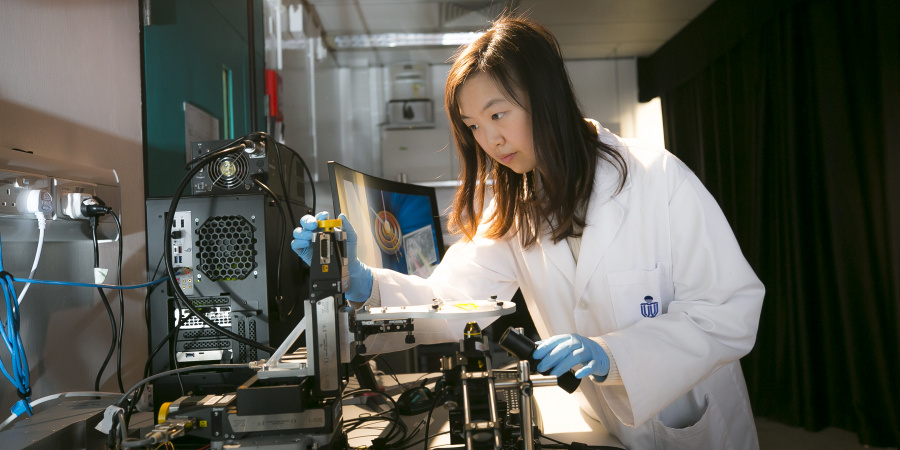A PhD Career Driven by Satisfaction of Transforming Innovative Ideas to Practical Use
Local Hong Kong student Ivy WONG Hei-Man shares how she transformed from “not a science person” into a Bioengineering PhD student exploring novel frontiers. She discusses the diverse opportunities at HKUST since joining the University as an undergraduate, and the meaningful bioimaging research work which earned her the prestigious Butterfield Croucher Studentship and Croucher Research Studentship in 2021.
Unlike the great stories of some famous scientists, I must confess I was not a “science person” and I would never have imagined myself being at the forefront of technological innovation if you had asked me 10 years ago. Being a simple girl born in an ordinary family from Cheung Chau, it was never my childhood dream to become a researcher.
My first inspiration for engineering originated from the Hong Kong Chemistry Olympiad at high school. Back then, I had the opportunity to work with my friends on a project of breathalyzer for ethanol content detection. It was not any cutting-edge project though, but I would remember that it was my first time to design experiments and get to feel the joy of building things from scratch.
HKUST is where I got the chance to explore my interests with lots of open opportunities provided. I am really blessed that, after joining HKUST as an undergraduate in Chemical and Biomolecular Engineering, I have had the chance to join an international research project competition – iGEM. The iGEM-HKUST is a student-initiated project group where I and my teammates could propose any crazy ideas to utilize genes as building blocks to engineer tools for real-world applications. It is also a memorable experience to present our work in the grand Jamboree held in Boston, US in front of many talents across the globe and I was so fascinated by their creativity and passion in science and engineering. Although by that time my team had just completed the proof-of-concept stage, the satisfaction of coming up with an innovative while feasible idea simply caught my breath and made me wonder “What may I do more?” In fact, that was the moment that really got me started on planning a career as a research student.
My friends always ask me “Why study PhD in Hong Kong?” My answers could be simple. I met a good teacher and a meaningful research area that I am interested in – bioimaging for medical applications – through my final year project in the last year of my undergraduate studies. In my postgraduate life, I have been primarily working on CHAMP (computational high-throughput autofluorescence microscopy by pattern illumination), a thick tissue imaging technology that provides cellular images to assist surgeons in determining if cancer cells have been completely removed. Current procedures can take days before results are generated. For patients, this means living in fear for a lengthy period, anxiously waiting to hear whether they will need a second operation. With CHAMP, analysis and results can be returned in three minutes during surgery, eliminating the need for second operations, which I see as a really meaningful development.
I am blessed with my PhD supervisor Prof. Terence WONG’s kind support, as he provided me with huge encouragement and supportive guidance whenever I wanted to try up new ideas and failed. I am also blessed with the support I have had from the Croucher Foundation. The studentships were a great recognition to me and my research focus. It means so much for us research students to know our efforts are appreciated, especially after long nights of brainstorming and debugging. There is nothing better to lift my spirits than recognition from the talented scholars.
Some might hesitate to pursue a doctoral degree since it seems the only career destination is academia and the life of a PhD student is nothing but “permanent head damage” and 24 hours in the lab. While it might be true that I spend long hours in my lab, a PhD is certainly a lot more than a degree – it is a part of my career-building, from academia to application. What I wish to achieve is not only good research but to translate this work into practical use. Luckily, I have gained the opportunity to form a start-up, PhoMedics, with fellow researchers and Prof. Wong to translate CHAMP technology to a marketable product. There are many new areas to tackle when setting up a company, ranging from product design to regulatory concerns and business strategy. It is certainly challenging but together with a good team from diverse backgrounds, and the support and funding provided by HKUST for its spin-offs, we are growing collectively.
It is never wrong to become a PhD student if you are looking for a challenge in realizing your idea. A PhD in engineering does not mark the end in the field. On the contrary, it provides good training to equip yourself with a problem-solving mindset to accept new challenges. It could even be the first step to building your own career in technology innovation.
It is especially true for women who want to take a shot at joining the pack! Undoubtedly, we work in a vigorous field, but engineering is one that treasures innovation, logic, and cautious validation, qualities that both men and women possess. In fact, many of my female friends in Hong Kong and abroad are doing very well in their respective areas.
Science and engineering never discriminate, and I do look forward to seeing more women in these spheres!
Related link:

